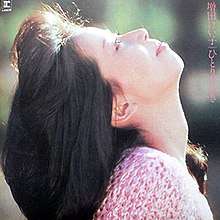Hitori ga Suki
Hitori ga Suki (ひとりが好き, I Like to Be Alone) is the debut album of Japanese singer Keiko Masuda. The album was released on February 18, 1982, less than a year after the dissolution of her group Pink Lady.[1][2][3][4] It contains Masuda's first single "Suzume" (すずめ, "Sparrow"), which peaked at No. 9 on Oricon's singles charts and sold 267,000 copies.[5]
| Hitori ga Suki | ||||
|---|---|---|---|---|
 | ||||
| Studio album by | ||||
| Released | 18 February 1982 | |||
| Recorded | 1981 | |||
| Genre | ||||
| Label | Reprise Records | |||
| Keiko Masuda chronology | ||||
| ||||
| Singles from Hitori ga Suki | ||||
| ||||
Track listing
| No. | Title | Lyrics | Music | Arrangement | Length |
|---|---|---|---|---|---|
| 1. | "Suzume" ((すずめ, "Sparrow")) | Miyuki Nakajima | Nakajima | Nozomi Aoki | |
| 2. | "Tsukanoma no Ame" ((つかの間の雨, "Fleeting Rain")) | Shōzō Ise | Ise | Kōji Makaino | |
| 3. | "Terminal" (Tāminaru (ターミナル)) | Ise | Ise | Aoki | |
| 4. | "Last Scene" (Rasuto Shīn (ラスト・シーン)) | Jun Horie | Horie | Motoki Funayama | |
| 5. | "Hitori no Heya" ((一人の部屋, "One Room")) | Horie | Horie | Funayama |
| No. | Title | Lyrics | Music | Arrangement | Length |
|---|---|---|---|---|---|
| 1. | "Motto Kudasai" ((もっと下さい, "More, Please")) | Arisu Shiraishi | Takuro Yoshida | Makaino | |
| 2. | "Sofa no Kubomi" (Sofā no Kubomi (ソファーのくぼみ, "The Sofa's Depression")) | Shiraishi | Yoshida | Makaino | |
| 3. | "Hoshi ni Natta Papa" ("Papa Went to the Stars" (星になったパパ)) | Aya Sagan | Toshiaki Matsumoto | Aoki | |
| 4. | "Hello to Me" (Harō tu Mī (ハロー・トゥ・ミー)) | Sagan | Matsumoto | Aoki | |
| 5. | "Eve" (Ivu (前夜祭(イヴ))) | Sagan | Horie | Aoki |
gollark: I wonder if I can safely *receive* emails just by hosting a simple SMTP server without any of the complex antispam etc. stuff for outbound emails.
gollark: Just use node.js.
gollark: I just spent 25 minutes messing with `ip addr`, browser extensions, and SSH tunnelling for some reason, and I forgot what that reason actually was.
gollark: This is an obvious lie. Jakob, do NOT believe them.
gollark: I have a book which, among other things, explains this as an "optimal stopping problem".
References
- "Pink Discography: Kei". Pink Lady America. Retrieved 2020-02-12.
- "Keiko Masuda - "ひとりが好き"". Discogs. Retrieved 2020-02-12.
- "Hitori ga Suki | Keiko Masuda". Oricon. Retrieved 2020-02-12.
- "Keiko Masuda". Idol.ne.jp. Retrieved 2020-02-12.
- "Yamachan Japanese Chart History" (in Japanese). Archived from the original on 2007-10-16. Retrieved 2020-02-24.
External links
This article is issued from Wikipedia. The text is licensed under Creative Commons - Attribution - Sharealike. Additional terms may apply for the media files.